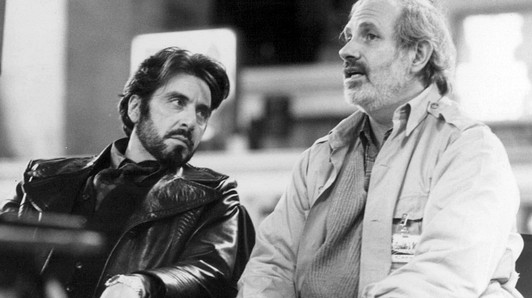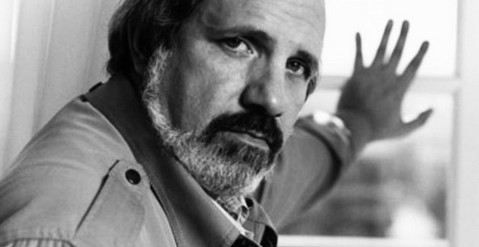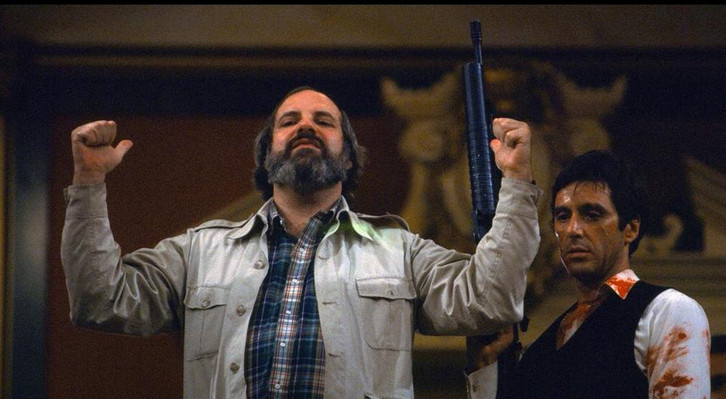DE PALMA
Monday, October 3, 7:30 pm
Reviewed by Joshua Rothkopf – Time Out New York
One of the most revealing documentaries ever made about a filmmaker, Noah Baumbach and Jake Paltrow’s juicy profile of suspense expert Brian De Palma doubles down on its subject’s famous obsessions with Hitchcock, gorgeous women in peril and coke-snorting gangsters. In the process, it reclaims a peevish Hollywood giant from his own worst instincts. Even if you're not a fan of the director’s voluptuous imagery (you have our sympathies), it's possible to emerge from this feisty two-hour portrait—in which only De Palma speaks—with an unforgettable impression of a complex, brashly entertaining survivor. Baumbach and Paltrow clearly indulge him like they would a crazy uncle, and the stories they got are worth it, many of them unflattering.
A straight film-by-film chronology with a single camera fixed on its seated narrator, De Palma plunges with unusual depth into personal history, craft and pure cash-on-the-barrelhead movie budgeting. There’s a ton of moxie from the man himself: a self-described science geek who followed his philandering dad with a camera during his infidelities. The filmmaker is endearingly partial to the exclamation “Holy mackerel,” which gets applied to a formative screening of Jean-Luc Godard’s Weekend; to being blown away by a then-undiscovered Robert De Niro; to selling his Dressed to Kill script for a cool million. His account of his professional accent makes for a vigorous, no-bullshit counterweight to the often naively presented tale of the '70s movie brats: Marty, Francis, Steven, George, all peers (if not always friends).
But the doc transcends mere film-buff details for a fascinating, slowly emerging portrait of a pigheaded provocateur, maybe somewhere on the spectrum. Why did Body Double’s murder weapon, a model-impaling power drill, have to be so long and phallic? That’s only logical, of course: “It had to go through the floor too.” Why does De Palma’s camera chase so many leggy female victims? “I'd rather be following around a girl than a guy.” Why did his marriages end? “My true wife is my movie, not you.” De Palma’s straightforwardness is often exhilaratingly impolitic.
Even more absorbing than this defensiveness, though, is De Palma’s obvious fury at defeats that still sting. Cursed with a razor-sharp memory at age 70 (these interviews were shot in 2010), the director seems to recall every tiny dispute and major war, from arguments with Mission: Impossible's script doctor Robert Towne over the ending, to the vast critical dislike for his Hindenburg version of The Bonfire of the Vanities: “I understood the book perfectly,” he spits, clearly reacting to snubs from 25 years ago.
It all adds up to an exposure that goes well beyond appraisal, entering into rare realms of frustration, dysfunction, euphoria and cynicism. Baumbach and Paltrow do De Palma's work justice via intelligently selected clips, a string of which—dating from 1974’s Phantom of the Paradise and the now-classic Carrie, to daring ’80s triumphs like Blow Out and Casualties of War—should be a religious experience for fans. But this is hardly a sermon. It's more like confession, the director still seething and replaying Vertigo in his head, lost in the curves of his career. De Palma is a public therapy session that upturns all expectations.
A DISCUSSION FOLLOWS EVERY FILM!
$6.00 Members / $10.00 Non-Members
Monday, October 3, 7:30 pm
Reviewed by Joshua Rothkopf – Time Out New York
One of the most revealing documentaries ever made about a filmmaker, Noah Baumbach and Jake Paltrow’s juicy profile of suspense expert Brian De Palma doubles down on its subject’s famous obsessions with Hitchcock, gorgeous women in peril and coke-snorting gangsters. In the process, it reclaims a peevish Hollywood giant from his own worst instincts. Even if you're not a fan of the director’s voluptuous imagery (you have our sympathies), it's possible to emerge from this feisty two-hour portrait—in which only De Palma speaks—with an unforgettable impression of a complex, brashly entertaining survivor. Baumbach and Paltrow clearly indulge him like they would a crazy uncle, and the stories they got are worth it, many of them unflattering.
A straight film-by-film chronology with a single camera fixed on its seated narrator, De Palma plunges with unusual depth into personal history, craft and pure cash-on-the-barrelhead movie budgeting. There’s a ton of moxie from the man himself: a self-described science geek who followed his philandering dad with a camera during his infidelities. The filmmaker is endearingly partial to the exclamation “Holy mackerel,” which gets applied to a formative screening of Jean-Luc Godard’s Weekend; to being blown away by a then-undiscovered Robert De Niro; to selling his Dressed to Kill script for a cool million. His account of his professional accent makes for a vigorous, no-bullshit counterweight to the often naively presented tale of the '70s movie brats: Marty, Francis, Steven, George, all peers (if not always friends).
But the doc transcends mere film-buff details for a fascinating, slowly emerging portrait of a pigheaded provocateur, maybe somewhere on the spectrum. Why did Body Double’s murder weapon, a model-impaling power drill, have to be so long and phallic? That’s only logical, of course: “It had to go through the floor too.” Why does De Palma’s camera chase so many leggy female victims? “I'd rather be following around a girl than a guy.” Why did his marriages end? “My true wife is my movie, not you.” De Palma’s straightforwardness is often exhilaratingly impolitic.
Even more absorbing than this defensiveness, though, is De Palma’s obvious fury at defeats that still sting. Cursed with a razor-sharp memory at age 70 (these interviews were shot in 2010), the director seems to recall every tiny dispute and major war, from arguments with Mission: Impossible's script doctor Robert Towne over the ending, to the vast critical dislike for his Hindenburg version of The Bonfire of the Vanities: “I understood the book perfectly,” he spits, clearly reacting to snubs from 25 years ago.
It all adds up to an exposure that goes well beyond appraisal, entering into rare realms of frustration, dysfunction, euphoria and cynicism. Baumbach and Paltrow do De Palma's work justice via intelligently selected clips, a string of which—dating from 1974’s Phantom of the Paradise and the now-classic Carrie, to daring ’80s triumphs like Blow Out and Casualties of War—should be a religious experience for fans. But this is hardly a sermon. It's more like confession, the director still seething and replaying Vertigo in his head, lost in the curves of his career. De Palma is a public therapy session that upturns all expectations.
A DISCUSSION FOLLOWS EVERY FILM!
$6.00 Members / $10.00 Non-Members









